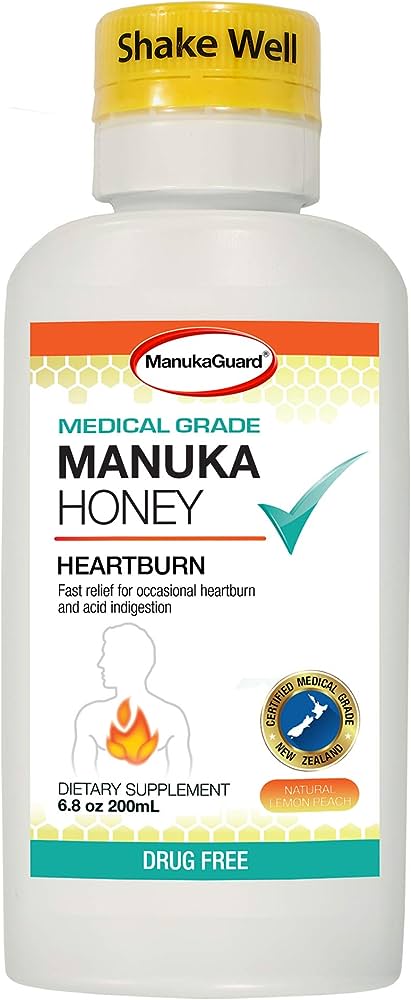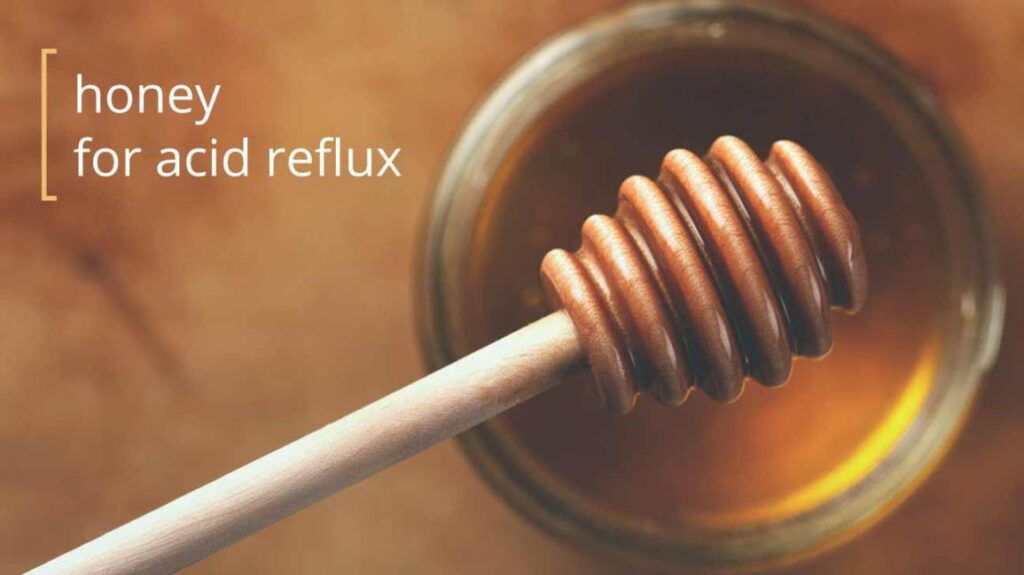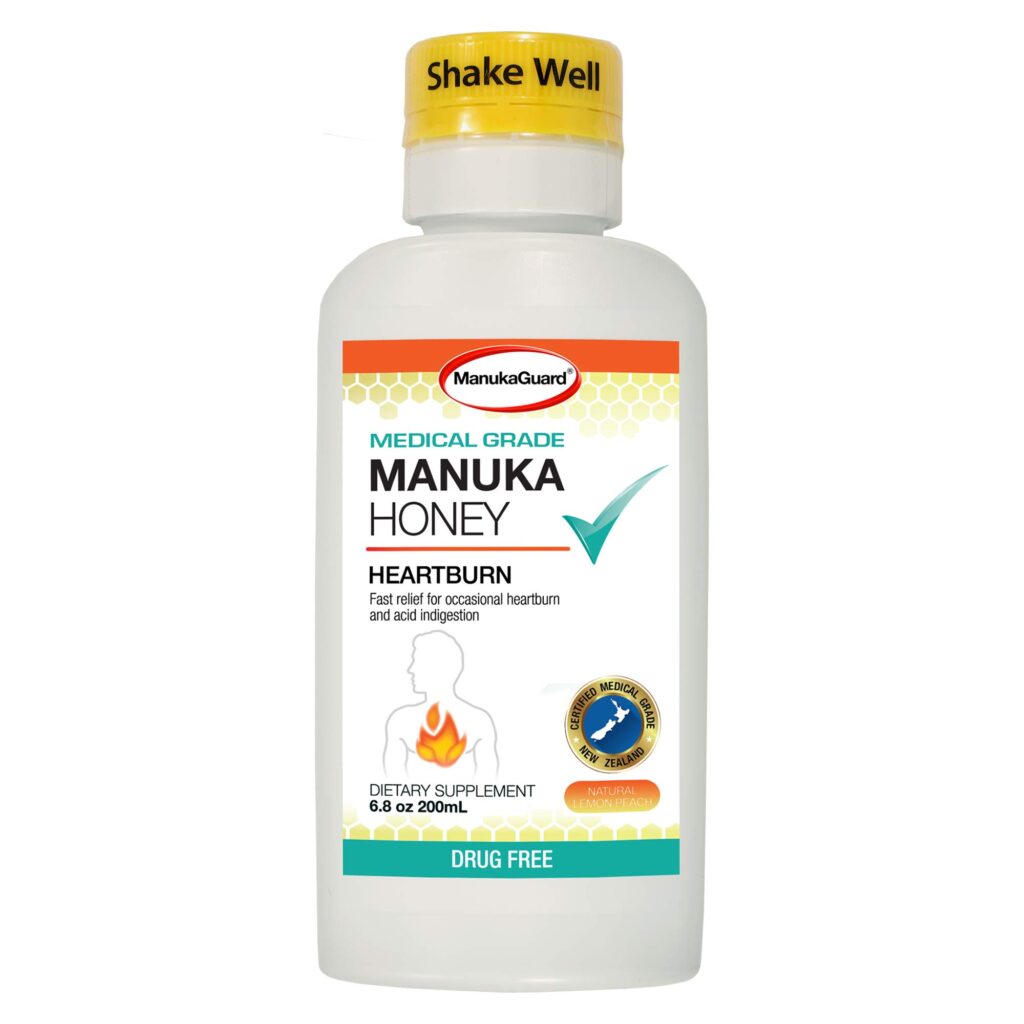
If you’ve ever experienced the discomfort of acid reflux, you may have wondered if there is a natural remedy out there that could provide relief. In your search for answers, you may have come across the mention of manuka honey as a potential solution. But does manuka honey really help with acid reflux? In this article, we will explore the potential benefits of manuka honey and its effects on acid reflux symptoms. So, let’s dive in and uncover the truth behind this sweet and tangy remedy.

What is Manuka Honey?
Definition of Manuka Honey
manuka honey is a unique type of honey that is produced by bees who gather nectar from the flowers of the Manuka plant, which is native to New Zealand. It is known for its rich, distinctive flavor and dark amber color. Manuka honey has been used for centuries in traditional medicine for its various health benefits, including its potential to help with acid reflux.
Properties of Manuka Honey
Manuka honey is renowned for its exceptional properties that set it apart from other types of honey. It contains a natural compound called Methylglyoxal (MGO), which is responsible for its antibacterial activity. The higher the MGO content, the stronger the antibacterial properties of the honey. In addition to MGO, Manuka honey also contains other beneficial compounds such as hydrogen peroxide, which further enhance its therapeutic effects.
Understanding Acid Reflux
Definition of Acid Reflux
Acid reflux, also known as gastroesophageal reflux disease (GERD), is a condition in which the stomach acid flows back up into the esophagus, causing a burning sensation and discomfort in the chest area. It is a common digestive disorder that affects millions of people worldwide.
Causes of Acid Reflux
There are several factors that can contribute to the development of acid reflux. One of the main causes is a weakened or malfunctioning lower esophageal sphincter (LES), which is the muscle that acts as a valve between the stomach and the esophagus. When the LES is not functioning properly, it allows stomach acid to flow back into the esophagus. Other factors that can increase the risk of acid reflux include obesity, hiatal hernia, certain medications, and unhealthy lifestyle habits such as smoking and excessive alcohol consumption.
Symptoms of Acid Reflux
The symptoms of acid reflux can vary from person to person, but common symptoms include a burning sensation in the chest (heartburn), regurgitation of acid into the mouth, difficulty swallowing, and a sour or bitter taste in the throat. Some individuals may also experience coughing, wheezing, hoarseness, and chest pain.
The Link Between Manuka Honey and Acid Reflux
Research suggests that Manuka honey may have beneficial effects on acid reflux due to its unique properties. The antibacterial properties of Manuka honey can help eliminate harmful bacteria in the digestive system, which may contribute to the development of acid reflux. Additionally, Manuka honey has been found to have a soothing effect on the stomach lining and may help reduce inflammation, thereby alleviating the symptoms of acid reflux.
Antibacterial Properties of Manuka Honey
One of the key properties of Manuka honey is its powerful antibacterial activity. The high levels of MGO in Manuka honey give it potent antimicrobial properties, making it effective against a wide range of harmful bacteria, including those that can contribute to acid reflux. Studies have shown that Manuka honey can inhibit the growth of Helicobacter pylori, a bacterium that is commonly associated with peptic ulcers and acid reflux. By eliminating these bacteria, Manuka honey may help reduce the risk of acid reflux and promote a healthy digestive system.

Healing Effects of Manuka Honey on the Digestive System
Manuka honey has been used for centuries to promote digestive health. It has a soothing and healing effect on the digestive system, helping to alleviate the symptoms of acid reflux. The natural enzymes present in Manuka honey can help break down food and improve digestion, while its anti-inflammatory properties can help reduce inflammation in the esophagus and stomach. Additionally, Manuka honey may promote the growth of beneficial bacteria in the gut, helping to maintain a healthy balance of gut flora.
Ability of Manuka Honey to Balance Stomach Acid
Another potential benefit of manuka honey for acid reflux is its ability to balance stomach acid levels. While it may seem counterintuitive to consume honey, which is acidic, in order to treat acid reflux, research suggests that Manuka honey can help stabilize the pH levels in the stomach. This can help reduce the acidity of stomach acid and prevent it from flowing back into the esophagus, thus alleviating the symptoms of acid reflux.

Potential Role of Manuka Honey in Reducing Inflammation
Inflammation is a common underlying factor in many digestive disorders, including acid reflux. The anti-inflammatory properties of Manuka honey may help reduce inflammation in the esophagus and stomach, which can contribute to the development and severity of acid reflux. Research has shown that the antioxidants present in Manuka honey can inhibit the production of pro-inflammatory substances and promote the healing of damaged tissues. By reducing inflammation, Manuka honey may provide relief from the symptoms of acid reflux and contribute to overall digestive health.
How to Use Manuka Honey for Acid Reflux Relief
Selecting the Right Manuka Honey
When using manuka honey for acid reflux relief, it is important to choose a high-quality product with a high MGO rating. The MGO rating indicates the concentration of Methylglyoxal in the honey, which determines its antibacterial activity. Look for Manuka honey with a minimum MGO rating of 400 or more to ensure maximum therapeutic benefits.
Dosage and Frequency
The recommended dosage of Manuka honey for acid reflux relief varies depending on the severity of symptoms and individual tolerance. Start with a small amount, such as one teaspoon, and gradually increase the dosage as needed. It is generally recommended to consume Manuka honey before meals or at bedtime to help soothe the digestive system and prevent acid reflux. However, it is important to consult with a healthcare professional for personalized advice on dosage and frequency.
Possible Side Effects or Precautions
While Manuka honey is generally safe for consumption, it is important to be aware of potential side effects and precautions. Some individuals may be allergic to honey or have a sensitivity to certain compounds in Manuka honey. If you experience any adverse reactions such as allergic symptoms or digestive discomfort, discontinue use and consult a healthcare professional. Additionally, Manuka honey is high in sugar and calories, so it is important to consume it in moderation as part of a balanced diet.

Scientific Research on Manuka Honey and Acid Reflux
Scientific research on the use of Manuka honey for acid reflux is still limited, but preliminary studies have shown promising results. A study published in the journal “BMC Complementary Medicine and Therapies” found that Manuka honey significantly reduced the symptoms of acid reflux and improved quality of life in individuals with gastroesophageal reflux disease (GERD). Another study published in the journal “Toxins” demonstrated that Manuka honey can inhibit the growth of Helicobacter pylori, a bacterium commonly associated with acid reflux and peptic ulcers.
Conclusion
While more research is needed to fully understand the potential benefits of Manuka honey for acid reflux, the available evidence suggests that it may have a positive impact on digestive health. Its antibacterial properties, ability to balance stomach acid, and potential role in reducing inflammation make Manuka honey a promising natural remedy for acid reflux. However, it is important to consult with a healthcare professional before using Manuka honey as a treatment for acid reflux, as individual needs and medical conditions may vary. With proper guidance, Manuka honey can be a valuable addition to a comprehensive approach to managing acid reflux and promoting overall digestive well-being.
